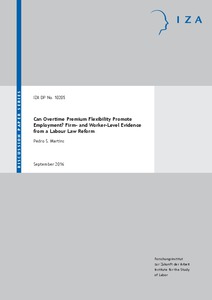Can overtime premium flexibility promote employment? Firm- and worker-level evidence from a labour law reform
"In 2012, in the midst of a recession, a labour law reform in Portugal allowed firms to reduce the overtime premium paid to their workers by 50% or more. Until then, overtime premiums were set by law at a relatively high level and could not be cut unilaterally. We analyse matched employer-emplo...
| Main Author: | |
|---|---|
| Institution: | ETUI-European Trade Union Institute |
| Format: | TEXT |
| Language: | English |
| Published: |
Bonn
2016
IZA |
| Subjects: | |
| Online Access: | https://www.labourline.org/KENTIKA-039612485789-Can-overtime-premium-flexibili.htm |
| Summary: | "In 2012, in the midst of a recession, a labour law reform in Portugal allowed firms to reduce the overtime premium paid to their workers by 50% or more. Until then, overtime premiums were set by law at a relatively high level and could not be cut unilaterally. We analyse matched employer-employee panel data, including worker-level base and overtime hours and pay, to shed light on the effects of the resulting greater flexibility in overtime pay setting. We find that half of the firms using overtime in 2011 did reduce their overtime premiums in a manner consistent with the reform, in particular those firms making greater use of overtime and paying higher premiums. Moreover, using difference-in-differences matching and a long list of covariates, we find that those firms that cut overtime premiums exhibit significant relative increases in overtime usage, employment and sales following the reform. Overall, our results highlight the important but not exclusive role of legal restrictions behind downward nominal pay rigidity. Our findings also suggest a significant potential of overtime pay flexibility to promote employment, even during a downturn." |
|---|---|
| Physical Description: | 31 p. Digital |

